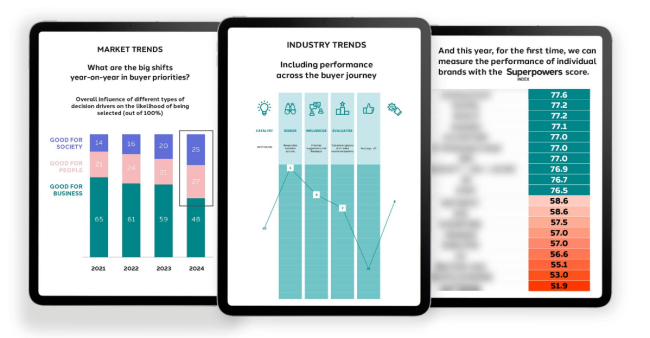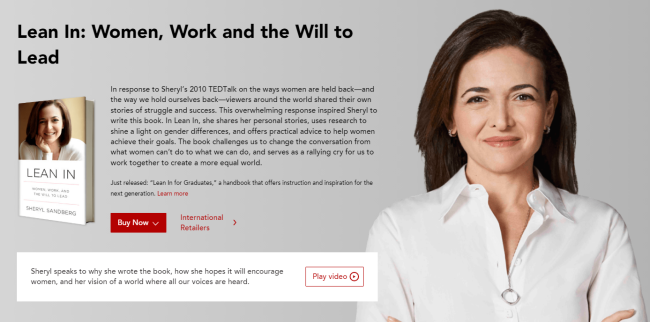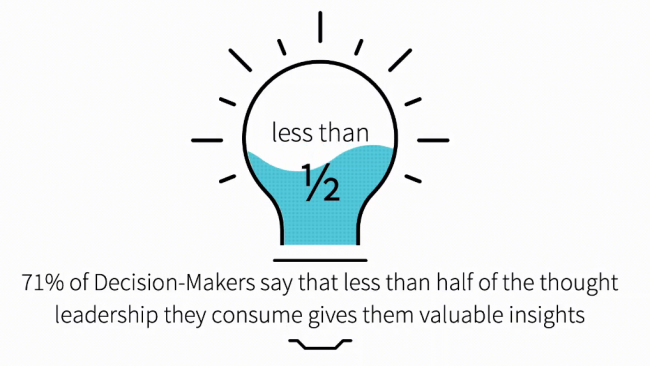Content pollution. Urgh! We all experience it. It’s an endless barrage of content and clickbait snapping at our virtual heels.
Generative AI has the potential to improve many aspects of life and work. But it’s also a digital steroid, fuelling mass content production on an industrial scale.
B2B buyers are not immune. Bombarded with information, it becomes increasingly difficult to wade through the noise and make informed buying decisions.
It is no surprise, then, that the direct consequence of this is a flight to quality content and thought leadership.
The Superpowers Index, a 2024 study into B2B buying behaviour, found this year that thought leadership had rocketed up the ranking to the third most important decision driver for B2B buyers, up from 20th last year.

What is thought leadership today?
Forbes defines a thought leader as ‘an individual or firm that prospects, clients, referral sources, intermediaries and even competitors recognise as one of the foremost authorities in selected areas of specialisation, resulting in its being the go-to individual or organisation for said expertise’.
Think Warren Buffett, a thought leader in the sphere of financial markets and one of the most influential and often quoted investors today.
Or Patagonia, a brand that has earned a reputation as a commercial thought leader in sustainability.

As a former CNN war correspondent and speechwriter for President Barack Obama, Aneesh Raman says true thought leadership is about ‘having authentic, relevant, insightful things to say about a few key issues and saying those things over a sustained period of time in order to provoke new thoughts and actions by others’.
Executive influencers
Influencer marketing now also plays a large part in B2B content strategies and thought leadership.
Executive influencers are usually high-ranking individuals (typically a CEO, CMO, or senior leader) who influence opinions through their position and leadership in a specific company or organisation. They leverage their authority and success within the company to build credibility and influence.
An example of an executive influencer is Sheryl Sandberg (Former COO, Meta/Facebook), known for her role in scaling Facebook’s business and her book Lean In, which positioned her as an influential voice on business leadership, particularly on gender equality in the workplace.

Or Brené Brown, known for her research on vulnerability, courage and empathy in leadership, whose bestselling books and TED Talks have shaped conversations around emotional intelligence and leadership, encouraging a shift towards more empathetic leadership practices.
The roles of these influencers in the business world mean when they share their expert insight with existing and new audiences, people sit up and listen. It can add further credibility to thought leadership—and help generate awareness of the content and brand to new audiences.
It is no surprise that B2B buyers are more likely to gravitate towards individuals or brands known for their innovative and leading insights than a brand with a scant thought leadership profile.
It pays to be the ‘real deal’

However, the LinkedIn-Edelman B2B Thought Leadership Impact Report found that close to a third (30%) of people producing thought leadership content admitted their organisations didn’t really know how to use it as a sales or marketing tool. And according to the Superpowers Index, only 26% of B2B brands are rated highly by buyers for their thought leadership, down from 31% in 2022. Despite its perceived importance, buyers’ impression of B2B brands’ thought leadership skills is waning fast.
It seems many brands are lagging when it comes to meeting the demand for quality thought leadership content. Such brands are missing out on the opportunity to increase their standing with potential B2B buyers. Brands that get it right, however, have a golden opportunity to differentiate themselves from competitors.
In a world of information overload, it pays to be the ‘real deal’. Lagging on thought leadership clearly impacts the bottom line.
Check out the work we do for thought leaders here on our Impact Stories page.










